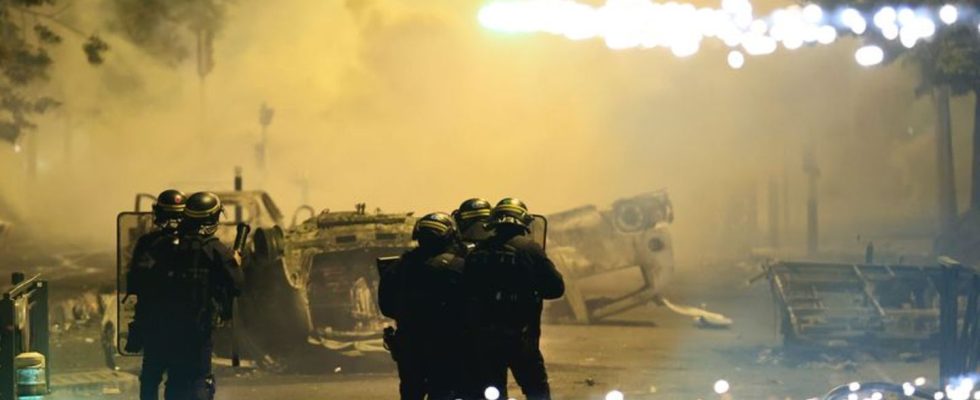riots
Riots: France falls to its feet as unresolved conflicts unfold
Riot police officers patrol a street in Nanterre during riots. photo
© Aurelien Morissard/AP/dpa
The explosion in the French suburbs was sudden, but the problems have long been known. Residents complain about social disadvantage, discrimination and racism.
The images of burning cars and violent battles between rioters and the police in France’s suburbs are reminiscent of the same conflicts in recent years. France’s politicians are now reeling from the specter of the 2005 riots after the death of a youth in a police shot near Paris and a third straight night of rioting. There was violent unrest for three weeks after the death of two young people who were being pursued by the police. These plunged the country into a crisis with emergency law and curfews.
The government is alarmed accordingly, President Emmanuel Macron called a crisis meeting on Friday. Contrary to what some expected, however, he did not declare a state of emergency, but merely appealed to parents to restrain their young children from taking part in violent protests. He also wanted to intervene against calls for riots on social networks.
There is a lot at stake for the head of state and France. The tenacious conflict over the pension reform, which led to mass protests with riots and a number of strikes that hampered the country, has only just been overcome. Macron then tried to give new impetus to his government, which has been slowed down by the loss of an absolute majority in parliament for a year, with hastily announced rapid improvements in many areas. Macron wanted to take stock on the national holiday, July 14th. Now, like in 2018 at the start of the yellow vest protests, he is suddenly faced with a nationwide crisis that could completely slip away from him.
Explosive power quickly recognized
Macron quickly recognized the explosive power of the video images, which showed how an officer shot a 17-year-old driver during a check in Nanterre without a concrete emergency. “We have a youth who was killed, that cannot be explained and cannot be excused,” said the president, and prevented his interior minister from putting himself in front of the officials to protect him. The admission of a police glitch by the President and shortly afterwards by Prime Minister Élisabeth Borne was not enough to stop the riots. Just as little as the fact that the officer was arrested on suspicion of manslaughter.
In fact, since 2005, the situation for suburban residents, many of whom have an immigrant background, has not fundamentally improved. Although billions of dollars were pumped into the development of the high-rise housing estates, the ghettoization of the districts and the isolation of their residents was not broken. Drug trafficking, high unemployment and hopelessness are rampant. Many people in the neighborhoods feel discriminated against and think they live in a racist country. They do not feel represented by politics and the fragmentation of French society can be seen in the cités, the high-rise areas.
Riots have a longer history
“What is happening in Nanterre is clearly part of a longer story,” sociologist and suburban researcher Julien Talpin told Liberation newspaper on Friday. “We haven’t seen anything like this since 2005.” Since the death of George Floyd in the United States in 2020, there has been no progress on police violence in France. “On the contrary, there was an intensification of police violence and the institution was completely closed to demands for reform.” In a way, the current conflagration is a consequence of power’s deafness to demands that had previously been peacefully expressed.
And how is France getting out of the crisis, what can stop the riots? There are already calls for a fundamental reform of the police force, which for many in the high-rise areas is the number one opponent. However, a change in the police force, which has been criticized for being repressive, cannot be decreed against the regulatory power itself, which is demanding more power from politicians in their operations in the suburbs. The announcement of a major police reform is unlikely to happen from now on.
As sociologist Talpin says, the problem extends beyond the police anyway. The suburban residents also accused the state and its institutions of discriminating and giving fewer opportunities to the slums. This is happening through a discriminatory discourse because no concrete measures are being taken for the districts and because racism is not being effectively combated from the residents’ point of view. To overcome all these unresolved conflicts and social cleavages, which are now suddenly coming to the fore, Macron and his government have not yet presented a major plan.

